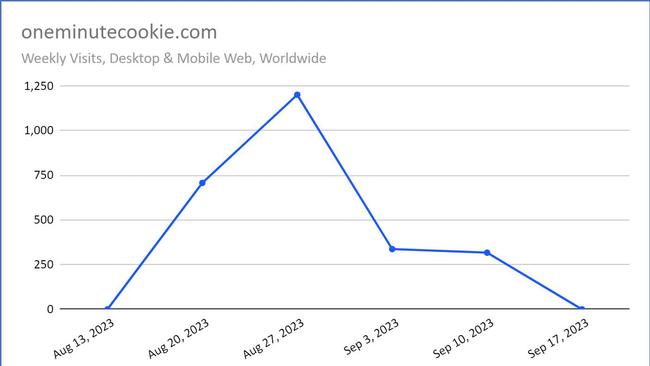Divide over ethics of climate charity’s browser manipulation
The campaign calls on young Australians to send a link to friends and family members who are sceptical of climate change, in order to manipulate what they see online.

Business
Don't miss out on the headlines from Business. Followed categories will be added to My News.
A youth climate change protest group has devised a strategy to manipulate algorithms to trick older Australians into receiving positive climate action stories and videos on their social media.
The campaign involves sending users a link to a website which at first appears to be an innocent instant cookie recipe but will, if a user clicks on the link, manipulate the content displayed to the user across the internet, forcing supportive green climate videos and articles into their feeds.
Behind the idea is a registered charity which recorded a revenue of near $3.2m over the past 12 months, almost 98 per cent of which has come from donations, and runs sustainability programs in Australian schools targeting children and teens.
The Australian Youth Climate Coalition has called on young Australians to send the link to friends and family members who are sceptical of climate change.
The move has divided researchers and internet ethicists who say if cyber criminals or state actors were to pursue a similar campaign it would unequivocally be considered malicious software, known as malware.
While cookies are used widely on the internet, in most cases they are being used to track user behaviour to sell products, not change their world or political views.

Grace Vegesana, AYCC’s director of climate & racial Justice, told The Australian that for young Australians, “climate change was the biggest fight of our lives – so we aren’t afraid to get creative in how we take action”.
“Ultimately, we’re taking action to create a fair and just world, with a stable climate and healthy environment for our communities and future generations – and don’t mind being a bit cheeky in the process,” she said.
AYCC is not taxpayer-funded. The charity also runs programs in schools, with one program, called Switched On Schools, aimed at teaching sustainability and “change-making skills”.
The campaign has been live for over six weeks since August 10, but was briefly offline on Wednesday.
The URL has had a total of 2561 people visits from mobile web and desktop devices, according to analysis from Israeli intelligence and web monitoring service Similarweb. That figure has dropped to zero over the past four days.
Cyber security firms have raised concerned about the campaign, with online threat intelligence company Check Point Research, which had a team investigate AYCC’s URL and the cookie manipulation technology.

“This method is kind of ‘grey’ … (it’s) difficult to tell whether it is fully legitimate or not from a legal perspective, but as it is doing some changes on your PC without your clear consent to what it is doing, I’d tend to say it is ‘fishy’ approach,” the team found.
The company’s tech evangelist Ashwin Ram, one of Australia’s top 100 Innovators, said the technique was not common but was something he imagined cyber criminals would use as part of phishing campaigns.
“While this may look innocent, any narrative could be pushed in this subtle way without the knowledge of the end user,” he said.
Cookies, Mr Ram said, were commonplace on the internet and were a way for companies to track user behaviour and target users with specific advertising.
“Cookies are small text files which store data including usernames and things like that to recognise an individual’s computer by a server or web server,” he said.
“When a computer interacts with a web server, the server can read the cookie and it can provide tailored information, very specific information to the end user.”
Mr Ram said cookies were used to “enhance the user experience”, but in the case of AYCC campaign, “it looks like the goal here was to lure sceptics of climate change to oneminutecookie.com”. He adds: “While the site looks innocent, a victim’s browser will store cookies that will affect their browsing experience by displaying content to support a particular narrative.”
More Coverage

Originally published as Divide over ethics of climate charity’s browser manipulation




